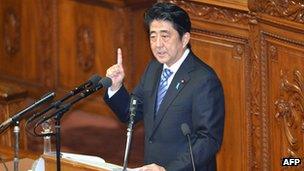Japan's economic growth slows down
- Published

Reviving the economy is a top priority for Prime Minister Shinzo Abe
Economic growth in Japan, the world's third-largest economy, slowed to 0.5% in the July-to-September period, down from 0.9% in the previous quarter.
The deceleration comes despite aggressive measures taken this year to spur growth after years of stagnation.
Japan's Prime Minister Shinzo Abe has made reviving the economy his top priority.
His economic policies, known as Abenomics, include boosting stimulus and key sector reforms.
Stronger growth seen earlier in the year had been driven by personal consumption, which weakened in the third quarter.
Reason for concern?
Tomohiko Taniguchi, Japan's councillor of the cabinet secretariat, said that despite the recent slowdown, the Japanese economy was still on track for growth.
The economy grew at an annualised pace of 1.9% in the third quarter. Although this was half the annualised rate of 3.8% recorded in the previous quarter, Mr Taniguchi said the pace was good enough.
"A year ago this time, the third quarter figure for 2012... we were talking about negative growth of more than 3%," he told the BBC.
Mr Abe came to power last December and has unveiled a series of measures to help ensure long-term economic growth for the Asian nation.
His "Abenomics" policies are based on the so-called "three arrows" - monetary policy, fiscal stimulus and structural reforms.
The first arrow, monetary policy, is aimed at ending Japan's almost two decades of falling prices, or deflation.
The second arrow has seen Mr Abe announce plans to boost government spending on infrastructure, to foster growth.
And the third arrow - key sector reform - is aimed at encouraging private investment in the country.
- Published8 September 2013
- Published12 August 2013
- Published19 July 2013